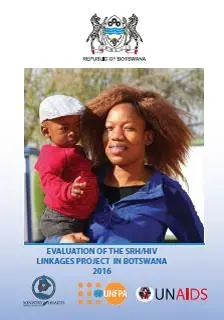Linking efforts to improve sexual and reproductive health and rights (SRHR) with HIV services is vitally important. HIV is sexually transmitted or associated with pregnancy, childbirth, and breastfeeding, and the presence of certain sexually transmitted infections (STIs) further increases the risk of HIV transmission. Sexual and reproductive ill health and HIV often share root causes, including poverty, gender inequality, and the social marginalization of vulnerable groups. Linking SRHR and HIV is expected to improve health outcomes by improving access to and uptake of services, reducing stigma and discrimination, streamlining services and reducing duplication of efforts, increasing the efficient utilization of human resources, and increasing the cost-effectiveness of efforts. UNFPA and the UNAIDS Regional SRHR and HIV Linkages in 7 Countries in Southern Africa Project was undertaken in response to this need. The Project, funded by the European Union (EU) and the Governments of Sweden and Norway, has supported seven countries in Southern Africa (Botswana, Lesotho, Malawi, Namibia, Swaziland, Zambia and Zimbabwe) to strengthen linkages between SRHR and HIV. The Project focused on three main result areas: provision of support to allow full linking of HIV and SRHR in national health and broader development strategies, plans, and budgets; enabling countries to link SRHR and HIV services better and scale them up effectively; and stimulation of formulation and dissemination of lessons learned, formulation of best practices, and facilitation of South-South cooperation in this field. In Botswana, the SRHR/HIV Linkages Project was overseen by a national interagency Technical Committee whose role was to coordinate, oversee, and implement the Project. Key members of this Technical Committee in Botswana included representatives from the Ministry of Health (MOH), who led and chaired the group; UNFPA; UNAIDS; the World Health Organization (WHO); the EU; and two local civil society organizations (CSOs) with demonstrated expertise in HIV and SRHR.
WHO WE ARE
WHAT WE DO
Evaluation of the SRH/HIV Linkages Project in Botswana

Publisher
Number of pages
44
Author
UNFPA/MOH/UNAIDS
Publication
Evaluation of the SRH/HIV Linkages Project in Botswana
Publication date
30 November 2016

